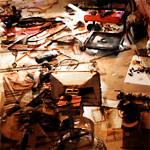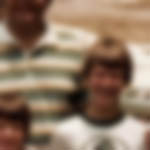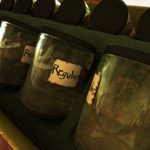 Until now the only remedies for people unable to otherwise cope in social forums involved psychotropic drugs, surgical modification of the frontal lobe, or surprise assassination. But now there is hope even for those of extreme disadvantage through a revolutionary system called Interactive Disengagement, actually a practical art form that balances engagement with detachment.
Until now the only remedies for people unable to otherwise cope in social forums involved psychotropic drugs, surgical modification of the frontal lobe, or surprise assassination. But now there is hope even for those of extreme disadvantage through a revolutionary system called Interactive Disengagement, actually a practical art form that balances engagement with detachment.
Putting this system in an anthropological context begins with the understanding that humans are intrinsically selfish, solitary creatures. As we no longer find ourselves huddled under rocks batting at cavebears, our natural instincts have atrophied to the point where casual social gatherings seem almost inevitable.
Let us now take a look at some of the dynamics of social behavior, and at some things we can do, through Interactive Disengagement, to minimize disgrace. We will use a party scenario to illustrate.
Scamper finds himself, horrified, at a house party. Though he’s found a group to associate himself with, he is nervous and crosses his arms to hide shaking hands and damp palms. In doing so he has made his first mistake by inadvertently taking the stance of the aloof expert. He is not aware that body language is an important part of social interaction.
“So, like,” says Dave, initiating a group discussion, “what’s the wackiest thing your family ever served guests?” As the others cluck approvingly, Scamper smiles to hide panic and scrambles for something to contribute should the expectation arise. Revelatory anecdotes, that is what’s called for. The idea comes to him that he might at least look cooler if he didn’t blink. That’s just the thing, thinks he, to convey a more intense, thoughty appearance. He concentrates on not blinking as he roots for ideas. Maria is saying, “My aunt served bouillabaisse to the children for Thanksgiving!” Approval is awarded through polite, metronomic laughter. Around the circle it goes, each contribution serving to connect the participants emotionally, reassuring them in the face of mortality that they are not alone. Not tonight anyway.
And then Scamper feels the pressure to speak. Forgetting himself he blinks his eyes for the first time in minutes, but has no time to halt the momentum as tears suddenly stream down his cheeks. “Papa once made my retarded brother eat a hooker. Um, that he- he was. He found…” But by now the conversation has died. The quaver in his voice has drained his words of life. Members of the group who aren’t baring their teeth in revulsion are covering their childrens’ ears, and an elderly couple begins to vomit uncontrollably.
Scamper’s anxious fear has revealed him as the awkward outsider; an interloper who threatens convention with his ignorance of societal mores. Naturally Scamper lashes out with his fists, and the night ends on an awkward note.
Location
The first thing one must do in any social gathering is to find a comfortable place to exist, preferably against a wall. People standing behind one are to be considered threats, and will probably make rude comments under their breath or just stare at one’s neck. Sitting in a chair with one’s head hanging, though comfortable, may actually draw unwanted attention. Rather, when gatherings threaten to become overwhelming, consider sneaking off and curling up on the cool bathroom floor.
Next, one must find a group of people against whom to practice peripheralism. The aim with peripheralism is to stand close enough to the group to seem open and approachable, but far enough away so that one isn’t actually forced to think of anything witty to contribute.
Appearance
Body language and personal appearance are indeed the first cues people look to in order to assign both social standing and content of character. This being so, one should strive for a kind of social invisibility by avoiding visual contrast with the other participants. If Scamper, in the scenario above, had approached the same circle with matted hair, unfocused eyes, a slack jaw, and hunched shoulders, and been muttering something like “gon’ dig me a hole,” repeatedly in a hoarse, singsong voice, chances are he would not be the first person consulted to expound on current events. While this may seem like a good thing, it is not the best approach to achieving social invisibility.
Nodding on cue gives people the perception that one is participating in a conversation, and will allay their fear that one is just watching. Avoid nodding for more than thirty seconds continuously.
The “thirty second principal” can, in fact, be applied to most social activities. The idea is that doing anything for more than about thirty seconds attracts attention. Social functions are not places for doing anything for prolonged periods of time. Being in society means moving, changing, being busy, and appearing more or less excited about the whole idea.
Behavior
Discouraging engagement requires both attention skill and quick thinking. One must identify the direction of conversational tide, decide on a plan for unsolicited attention, and execute the plan as required by the situation.
Avoiding eye contact figures heavily in this endeavor. Staring into someone’s eyes, especially if one hasn’t been blinking for several minutes, is often the only invitation others will need to engage one in conversation, or a fight. To avoid eye contact, focus on a spot directly between two adjacent people, or, in emergencies, over everyone’s head. If discovery seems imminent then one must remove oneself from the field of view entirely. Dropping to one knee to tie a shoe is heavily recommended. Alternately, one might look at one’s watch as obviously as possible, and then look laterally across the room as if in expectation of the rest of one’s party. This is called the “Where could they be?” technique.
When fear wets the palms of the sensitive one, it’s important not to hide them or to make fists. This will only make matters worse, especially if one must shake hands. Batting at phantom flies is a possibility if the palms are a little damp, but flailing in general should be avoided if the palms are soaking. For such occasions the best plan is to wear gloves.
Behavioral props such as not-blinking usually end in disaster, and should therefore be avoided at all costs. In order to “look cool” Scamper is sacrificing this bodily need, and that’s never cool. A more relaxed look might be achieved by lowering the eyelids slightly. Other bodily functions, such as breathing and urination, are best approached in a natural way, as too much or too little of either may draw attention. Another popular behavioral prop is speaking with an accent, but unless one has prepared a detailed fictional history, this is actually a behavior best avoided. However, speaking another language entirely is highly encouraged.
It is also important to avoid the rustic and unclean act of shaking hands. Shaking hands allows others to gauge one’s strength should a gathering turn ugly, and is also a great way to spread disease. One way handshaking can be avoided is to hold something in both hands, such as a cat or a baby. This is best done before one is asked to shake hands. Magazines make excellent props, because one can pretend to browse as needed, distancing oneself from the conversation. Avoid holding flaming objects or weaponry, which are looked upon as conspicuous in most circles that don’t involve white hoods. Pretending that there is something vile covering one’s hand works occasionally, but is enhanced greatly with a visual prop such as molasses or mustard. Sneezing into one’s hands will also do in a pinch. Preemptive blows to the requestor’s head should, in general, be considered only as a last resort.
Conclusion
The lesson in Interactive Disengagement, finally, is that participation is failure and to be avoided at all costs. In our next lesson we’ll talk about girls and how to avoid scaring them off by using the technique known as Gynocentric Disantisocialivism.
 I’ve been redistributing the world around me piece by piece. The idea first occurred to me as a practical solution to the observation that I simply owned too many things. But for one as reclusive as I, the practice of divesting from material goods is fraught with difficulty, particularly when faced with the possibility of having to interact with people. Yet how is one to one rid oneself of extraneous possessions without resorting to arson?
I’ve been redistributing the world around me piece by piece. The idea first occurred to me as a practical solution to the observation that I simply owned too many things. But for one as reclusive as I, the practice of divesting from material goods is fraught with difficulty, particularly when faced with the possibility of having to interact with people. Yet how is one to one rid oneself of extraneous possessions without resorting to arson? Dear Gloria, your erratic vibrations are draining my very life force. The way you churn your lips as you whisper to yourself is–I assure you–unnecessary, unless it is your conscious desire to amass the impressive volume of foam spittle at the corners of your mouth, which I witness daily. Also, though the industrial cleaning agent you wear for perfume makes your eyes water without abatement, I hope that, each day anew, you’ll reconsider your decision to carry around a blotter kleenex that you nervously crumple, and rumple, and work, and work, and work, and work, until little balls of ruined fluff drop like silken spider eggs from between your palsied fingers. I hope you will not think me cruel for mentioning these things, but I’ve found that the way you obsessively touch anything that comes to your attention–picking it up, putting it down, moving it just slightly, or just touching it… touch… touch…–is stirring up a demon inside me whose intentions I am not yet entirely clear on.
Dear Gloria, your erratic vibrations are draining my very life force. The way you churn your lips as you whisper to yourself is–I assure you–unnecessary, unless it is your conscious desire to amass the impressive volume of foam spittle at the corners of your mouth, which I witness daily. Also, though the industrial cleaning agent you wear for perfume makes your eyes water without abatement, I hope that, each day anew, you’ll reconsider your decision to carry around a blotter kleenex that you nervously crumple, and rumple, and work, and work, and work, and work, until little balls of ruined fluff drop like silken spider eggs from between your palsied fingers. I hope you will not think me cruel for mentioning these things, but I’ve found that the way you obsessively touch anything that comes to your attention–picking it up, putting it down, moving it just slightly, or just touching it… touch… touch…–is stirring up a demon inside me whose intentions I am not yet entirely clear on. “Hello there.” My stepfather would say hello to us whenever he entered the room, invariably. I quickly learned–by rote–that a response was expected. It didn’t seem so outrageous, of course. In fact it seemed a friendly enough thing to do, so I tried it myself for a while. “Hello, Mom. People? Hello. Hello, all.” It didn’t take though.
“Hello there.” My stepfather would say hello to us whenever he entered the room, invariably. I quickly learned–by rote–that a response was expected. It didn’t seem so outrageous, of course. In fact it seemed a friendly enough thing to do, so I tried it myself for a while. “Hello, Mom. People? Hello. Hello, all.” It didn’t take though. I noticed the car only because of the fancy sign propped up just behind its windshield, which was fogged like a cataract. The sign, intricately decorated with macaroni and glass beads, read, “Finally For Sale, $4,000,” like people had been waiting for it all this time. The sign was far more eye-catching than the subject of advertisement, itself a nondescript American make whose paint was of some elusive color between beige and gray. The U.S. does still craft nondescript cars, though the heyday of these little charmers was in the mid-seventies. Many of them didn’t live long enough to see the beginning of the eighties. These were cars made without flourish, lacking entirely any kind of stylistic nicety. And a $4,000 asking price was far too much to hope for.
I noticed the car only because of the fancy sign propped up just behind its windshield, which was fogged like a cataract. The sign, intricately decorated with macaroni and glass beads, read, “Finally For Sale, $4,000,” like people had been waiting for it all this time. The sign was far more eye-catching than the subject of advertisement, itself a nondescript American make whose paint was of some elusive color between beige and gray. The U.S. does still craft nondescript cars, though the heyday of these little charmers was in the mid-seventies. Many of them didn’t live long enough to see the beginning of the eighties. These were cars made without flourish, lacking entirely any kind of stylistic nicety. And a $4,000 asking price was far too much to hope for. The neighborhood where I grew up lay on the border between the old quarter and the new. The natives to the land were descendants of those left behind in the frontier days, themselves too unfit physically, socially, or mentally to make the trip westward. The late twentieth century had seen the rise of suburban sprawl and expensive homes, and with that came the lawyers and politicians willing to pay any price to live outside the nearest city. The divide between the old and new was a constant source of fascination for me, especially as tensions flared. On weekends I could hear them both from my bedroom window. To my left the bucolic rhythms of jaunty jug bands and the synchronized slap of bare feet on floorboards echoed into the night, and the morning brought fire and brimstone sermons and wails of repentance. To my right the antiseptic strains of classical music accompanied barbecue gatherings that spiced the air until dusk, and the morning brought the chatter of televisions to keep families safe from conversation and lawsuits.
The neighborhood where I grew up lay on the border between the old quarter and the new. The natives to the land were descendants of those left behind in the frontier days, themselves too unfit physically, socially, or mentally to make the trip westward. The late twentieth century had seen the rise of suburban sprawl and expensive homes, and with that came the lawyers and politicians willing to pay any price to live outside the nearest city. The divide between the old and new was a constant source of fascination for me, especially as tensions flared. On weekends I could hear them both from my bedroom window. To my left the bucolic rhythms of jaunty jug bands and the synchronized slap of bare feet on floorboards echoed into the night, and the morning brought fire and brimstone sermons and wails of repentance. To my right the antiseptic strains of classical music accompanied barbecue gatherings that spiced the air until dusk, and the morning brought the chatter of televisions to keep families safe from conversation and lawsuits. Until now the only remedies for people unable to otherwise cope in social forums involved psychotropic drugs, surgical modification of the frontal lobe, or surprise assassination. But now there is hope even for those of extreme disadvantage through a revolutionary system called Interactive Disengagement, actually a practical art form that balances engagement with detachment.
Until now the only remedies for people unable to otherwise cope in social forums involved psychotropic drugs, surgical modification of the frontal lobe, or surprise assassination. But now there is hope even for those of extreme disadvantage through a revolutionary system called Interactive Disengagement, actually a practical art form that balances engagement with detachment.